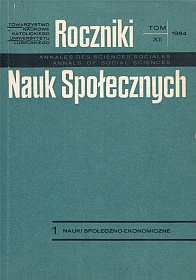Znaczenie i rola Uniwersalnej Deklaracji Praw Człowieka
Abstrakt
The paper’s aim is to show the importance and role of the Universal Declaration of Human Rights from 1948. It is done in the paper on several planes: 1. the Declaration was approved by nearly all international society, 2. it is concerned with the rights of every human individual irrespective of race, colour, sex, political views, nationality, birth, etc. 3. this is the declaration of human rights, and not only civil rights. Its addressee is not only the state but every human person.
The discussion on the legal character of the Declaration is still continuing. The author's opinion is that the Declaration should not be considered only as a „manifestation of good intentions” but as a document whose norms are binding to States. Her arguments are the following: The Declaration constitutes an extension of the UN Charter; through daily practice it can be recognized as one having norms binding to states; the Declaration has been often referred to by courts in some countries; it is also referred to by various UN conventions, declarations, resolutions, etc.
The author differentiates among three generations of human rights: 1st — freedom rights, 2nd — social rights and 3rd — the so-called solidarity rights. These latter are characterized by the fact that they appear on the international forums and their postulates and norms are first directed to international organs and organizations and not to internal legislature. They comprise the right to development, right to peace, right to living in unpolluted environment, right to human heritage, right to communication. Although rights have not been formulated yet as the international norms they have already been accepted in numerous resolutions and UN declarations.
Copyright (c) 1984 Roczniki Nauk Społecznych

Utwór dostępny jest na licencji Creative Commons Uznanie autorstwa – Użycie niekomercyjne – Bez utworów zależnych 4.0 Międzynarodowe.


